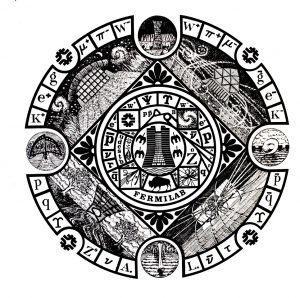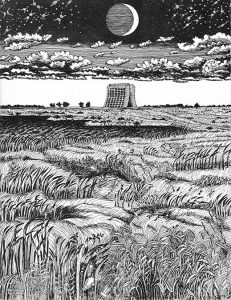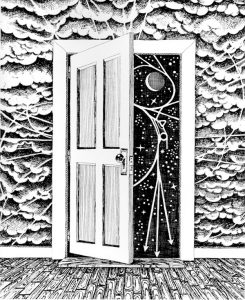“A Lasting Mark” highlights Fermilab history through the work of the lab’s first artist. The show premieres June 1 with a free public reception on June 5.

A Fermilab seal designed and drawn by Angela Gonzales, the laboratory’s first and only full-time artist.
The interplay of art and science has been an essential part of the U.S. Department of Energy’s Fermilab throughout its 50-year history. Nowhere is that more apparent than in the work of the legendary Angela Gonzales, the laboratory’s 11th employee and first and only full-time artist.
A new exhibit called “A Lasting Mark” will celebrate the contributions of Gonzales, who died in 2015, with an impressive collection of her work. Her bold colors and strong style influenced the very soul of the site, and her aesthetic sense meshed perfectly with that of the lab’s visionary first director, Robert Wilson.
A selection of Gonzales’ extensive collection will be on display in the Fermilab Art Gallery from June 1 to Sept. 30 as part of Fermilab’s 50th anniversary celebration. A free public reception is planned for Monday, June 5, at 5 p.m. Tours of the exhibit are planned for June 24, July 22 and Aug. 26 at 10 a.m. and you can sign up online for those.
The scope of Gonzales’ work is hard to fathom. Over 31 years – 1967 to 1998 – Gonzales left her stamp on all areas of the lab, from Fermilab’s iconic logo to the brightly hued propane tanks and buildings to imaginative posters and publication covers.
“Her work, in addition to just being gorgeous, made the science approachable and intriguing,” said Georgia Schwender, curator of the Fermilab Art Gallery. “She underscored that the science was more than just science. The science was art.”

Angela Gonzales’ logo design reflects the evolution of Robert Wilson’s ideas, unifying the various magnets in the Main Ring.
This exhibit captures Gonzales’ range. She made technical drawings of equipment, designed elevator ceiling panels, hand-painted tables (where employees still eat), sculpted vases, produced jewelry and flags, and picked the color palette Fermilab still uses today. Her talents covered everything from typography and optical art to photo collages and meticulous drawings. If there was a poster for a lab event, even something as simple as an Easter egg hunt, she designed it. From realistic nuts and bolts to abstract renditions of the Fermilab site, she drew it all.
“A Lasting Mark” features hundreds of pieces from the prolific artist, including dozens of posters designed for lectures and art performances, intricate covers of technical reports, and fun oddities, like a bison with a human head. There’s also a glimpse of the process behind how Gonzales created art, with several progressions showing the journey from initial concept to final design. The breadth of subjects makes this show an artistic excursion through Fermilab’s history, from prairie to particles.
“Angela captured and illustrated so much of life at the lab, whether it was science or people,” said Valerie Higgins, Fermilab’s archivist who maintains Gonzales’ collection and helped create the exhibit. “When you see how much she made and how detailed it was, you can’t believe one person could do it all. She started an artistic tradition that we strive to live up to.”
Fermilab continues the tradition of combining art and science at the lab. There are sculptures around the site, ever-changing performances through the Arts and Lecture Series, a vibrant art gallery, and a continuing artist-in-residence program. The current artist-in-residence, Geneva’s Jim Jenkins, will exhibit his work early in 2018.
The Fermilab Art Gallery is open to the public Monday to Friday, 8 a.m.- 4:30 p.m. All are invited to a free public reception for “A Lasting Mark” on June 5 from 5-7 p.m.
Fermilab is America’s premier national laboratory for particle physics research. A U.S. Department of Energy Office of Science laboratory, Fermilab is located near Chicago, Illinois, and operated under contract by the Fermi Research Alliance LLC. Visit Fermilab’s website at http://www.fnal.gov and follow us on Twitter @Fermilab.
The DOE Office of Science is the single largest supporter of basic research in the physical sciences in the United States, and is working to address some of the most pressing challenges of our time. For more information, please visit http://science.energy.gov.





